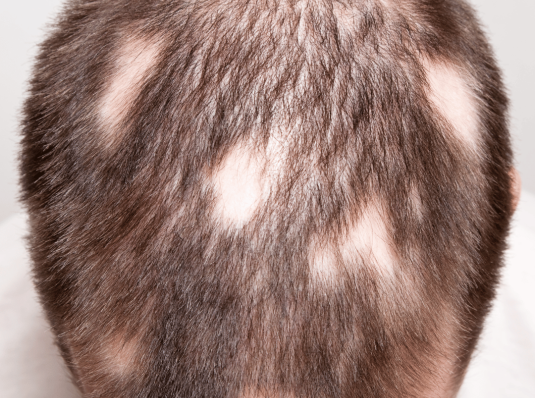Alopecia Areata

What is Alopecia Areata?
Alopecia Areata is an autoimmune disorder where the body's immune system mistakenly attacks hair follicles, leading to hair loss. This condition can result in small, round patches of hair loss on the scalp, face, and other parts of the body, and in some cases, complete baldness.
Symptoms of Alopecia Areata May Include:
- Sudden, patchy hair loss on the scalp or other body areas
- Tingling or itching in the affected areas
- Nails may become thin, brittle, or have small dents
Facts About Alopecia Areata
- Alopecia Areata affects nearly 2% of the global population at some point in their lives.
- The condition can occur at any age but often first appears during childhood or teenage years.
Who is at Risk for Alopecia Areata?
Risk factors for alopecia areata may include:
- Genetics: A family history of alopecia areata or other autoimmune diseases increases the risk.
- Sex: Both men and women are equally affected by alopecia areata.
- Age: While it can occur at any age, most people experience the first episode before the age of 30.
- Other Risk Factors: People with other autoimmune diseases, such as thyroid disease or vitiligo, are at higher risk.
How Many Americans Have Alopecia Areata?
Approximately 6.8 million people in the United States have or will develop alopecia areata during their lifetime.
Diagnosis & Management
Alopecia areata is typically diagnosed through a physical examination, medical history, and sometimes a biopsy of the affected skin. Blood tests may also be done to rule out other autoimmune conditions.
Treatment Options for Alopecia Areata
Medical and Pharmaceutical Treatments
- Topical Medications: Corticosteroids and minoxidil are commonly used to promote hair regrowth.
- Injections: Corticosteroid injections directly into the affected areas may help in more severe cases.
- Systemic Treatments: In cases of extensive hair loss, systemic immunosuppressants or JAK inhibitors may be considered.
Lifestyle Interventions
- Stress Management: Stress reduction techniques, such as mindfulness and therapy, can be beneficial.
- Diet and Nutrition: A balanced diet rich in vitamins and minerals may support overall hair health.
Have You Been Diagnosed with Alopecia Areata?
At Clinical Investigation Specialists, Inc. (CIS Research), our mission is to advance medical care for adults through innovative clinical research. You may be an eligible candidate for a clinical trial researching treatment options. For more information on currently enrolling clinical trials, click here.
Sources & Further Reading
- Alopecia Areata - National Alopecia Areata Foundation | NAAF
- Hair loss types: Alopecia areata overview (aad.org)
Find A Clinical Research Study
Learn more about clinical research.
Resources
CIS does not provide medical advice, diagnosis or treatment. The content provided is for informational purposes only.
Back To Health Education